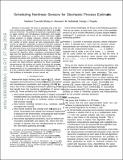| dc.contributor.author | Tzoumas, Vasileios | |
| dc.contributor.author | Atanasov, Nikolay A. | |
| dc.contributor.author | Pappas, George J. | |
| dc.contributor.author | Jadbabaie-Moghadam, Ali | |
| dc.date.accessioned | 2018-09-11T14:00:33Z | |
| dc.date.available | 2018-09-11T14:00:33Z | |
| dc.date.issued | 2017-07 | |
| dc.date.submitted | 2017-05 | |
| dc.identifier.isbn | 978-1-5090-5992-8 | |
| dc.identifier.uri | http://hdl.handle.net/1721.1/117700 | |
| dc.description.abstract | In this paper, we focus on activating only a few sensors, among many available, to estimate the state of a stochastic process of interest. This problem is important in applications such as target tracking and simultaneous localization and mapping (SLAM). It is challenging since it involves stochastic systems whose evolution is largely unknown, sensors with nonlinear measurements, and limited operational resources that constrain the number of active sensors at each measurement step. We provide an algorithm applicable to general stochastic processes and nonlinear measurements whose time complexity is linear in the planning horizon and whose performance is a multiplicative factor 1/2 away from the optimal performance. This is notable because the algorithm offers a significant computational advantage over the polynomial-time algorithm that achieves the best approximation factor 1/e. In addition, for important classes of Gaussian processes and nonlinear measurements corrupted with
Gaussian noise, our algorithm enjoys the same time complexity as even the state-of-the-art algorithms for linear systems and measurements. We achieve our results by proving two properties for the entropy of the batch state vector conditioned on the measurements: a) it is supermodular in the choice of the sensors; b) it has a sparsity pattern (involves block tri-diagonal matrices) that facilitates its evaluation at each sensor set. | en_US |
| dc.publisher | Institute of Electrical and Electronics Engineers (IEEE) | en_US |
| dc.relation.isversionof | http://dx.doi.org/10.23919/ACC.2017.7963015 | en_US |
| dc.rights | Creative Commons Attribution-Noncommercial-Share Alike | en_US |
| dc.rights.uri | http://creativecommons.org/licenses/by-nc-sa/4.0/ | en_US |
| dc.source | arXiv | en_US |
| dc.title | Scheduling nonlinear sensors for stochastic process estimation | en_US |
| dc.type | Article | en_US |
| dc.identifier.citation | Tzoumas, Vasileios, et al. “Scheduling Nonlinear Sensors for Stochastic Process Estimation.” 2017 American Control Conference (ACC), 24-26 May, 2017, Seattle, Washington, IEEE, 2017, pp. 580–85. | en_US |
| dc.contributor.department | Massachusetts Institute of Technology. Department of Civil and Environmental Engineering | en_US |
| dc.contributor.mitauthor | Jadbabaie-Moghadam, Ali | |
| dc.relation.journal | 2017 American Control Conference (ACC) | en_US |
| dc.eprint.version | Original manuscript | en_US |
| dc.type.uri | http://purl.org/eprint/type/JournalArticle | en_US |
| eprint.status | http://purl.org/eprint/status/NonPeerReviewed | en_US |
| dc.date.updated | 2018-08-16T16:39:31Z | |
| dspace.orderedauthors | Tzoumas, Vasileios; Atanasov, Nikolay A.; Jadbabaie, Ali; Pappas, George J. | en_US |
| dspace.embargo.terms | N | en_US |
| mit.license | OPEN_ACCESS_POLICY | en_US |
